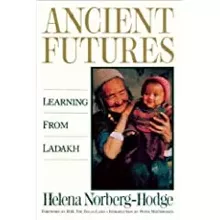Comentario personal:
- Este tema está en inglés, ya que es el idioma original del documental y no he encontrado los subtítulos correspondientes en castellano.
Ancient Futures, en Learning from Ladakh, escribió:Ladakh, or "Little Tibet", is a wildly beautiful desert land high in the western Himalayas. It is a place of few resources and an extreme climate. Yet, for more than a thousand years, it has been home to a thriving culture. Traditions of frugality and co-operation, coupled with an intimate and location-specific knowledge of the environment, enabled the Ladakhis not only to survive, but to prosper. Then came "development". Now in Leh, the capital, one finds pollution and divisiveness, inflation and unemployment, intolerance and greed. Centuries of ecological balance and social harmony are under threat from modernisation. The breakdown of Ladakh's culture and enviroment forces us to re-examine what we really mean by "progress" -- not only in the "developing" parts of the world, but in the industrialized world as well. The story of Ladakh teaches us about the root causes of environmental, social and psychological problems, and provides valuable guidelines for our own future.
---REVIEW---
What happens when modern development encroaches upon an ancient culture high in the harsh Tibetan plateau of northern India? Not even Ladakhis--mostly Buddhists with deep spiritual ties to the earth--can resist the onslaught of an increasingly global economy. This insightful case study, based on Helena Norberg-Hodge's book of the same title (published by Sierra Club Books in 1991), examines how development, with its attendant seductive images of glamour and gadgets promising life free of hardship, destroys social and ecological bonds.
Pollution, resource depletion, sprawl, breakdown of family and community, crime, growing economic disparity--all are crises in industrialized nations. While these problems are not the sole province of the West, Norberg-Hodge traces their appearance in Ladakh to Western notions of progress And because modernization has taken hold so rapidly here, the roots of these modern maladies, mostly obscured in the West, are easier to trace.
"Development has systematically dismantled the local economy and self-reliance, and the first victim is the small farmer whose livelihood is completely undermined," Norberg-Hodge tells us. Ladakhis are buying heavily subsidized wheat trucked in from the plains of India because it's cheaper than grain grown minutes away in local villages. They are drifting away from a cooperative small-farm model, based on organic farming and renewable resources, toward dependence on chemical-intensive agriculture and imported goods and services. Once protected from food shortages and rationing by these close-knit communities, villagers are now at the mercy of market forces beyond their control and of roads that are impassable two-thirds of the year. Forced into competition for scarce, meaningless work that doesn't pay enough to meet basic needs, they've become alienated from their neighbors. Broken community ties have led to escalating crime and homelessness, virtually unheard of 20 years ago. "There has been progress," one Ladakhi says, "but people are not as happy as they once were."
Respect for ecological limits is yielding to modern promises of uncontrolled economic growth and consumption, as this fragile high-desert ecosystem succumbs to the corollaries of modernization: garbage- and human-waste-filled streets and waterways, chemical-fertilizer and pesticide-laden fields, increasing population and ethnic friction, and loss of respect for women and families.
The film does not suggest that we renounce our wicked Western ways and head for the hills, but that we reestablish our ties to the earth, recognize its natural limitations by developing renewable energy sources and recycling waste, and resist globalization by supporting local cottage industries and small farmers. In the end, these rules to live by transcend cultural boundaries, and Norberg-Hodge eloquently shows us the way to follow them.
DVDRip VO - AVI [499 Mb]
detalles técnicos u otros: mostrar contenido
 Ancient Futures - Learning from Ladakh (permaculture).avi [499.88 Mb]
Ancient Futures - Learning from Ladakh (permaculture).avi [499.88 Mb] 
 Descargar con Telegram desde RebeldeMule_Documentales
Descargar con Telegram desde RebeldeMule_Documentales


